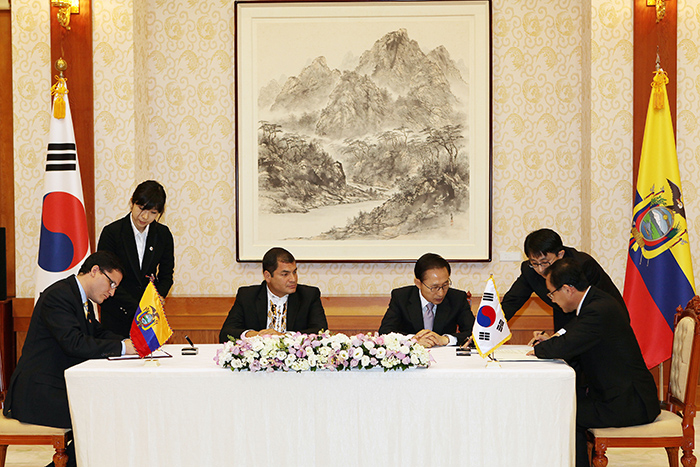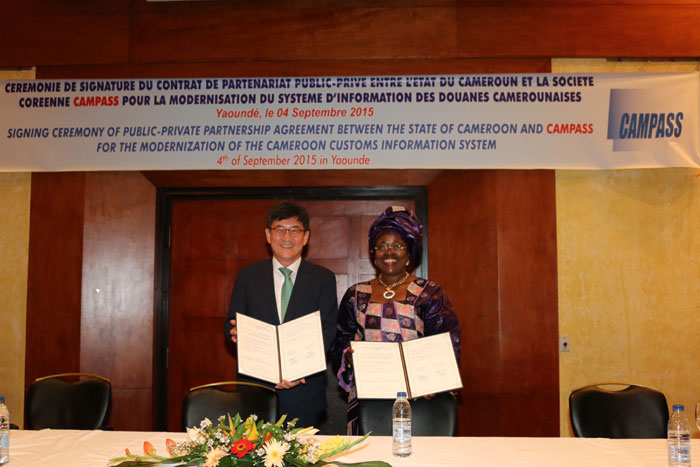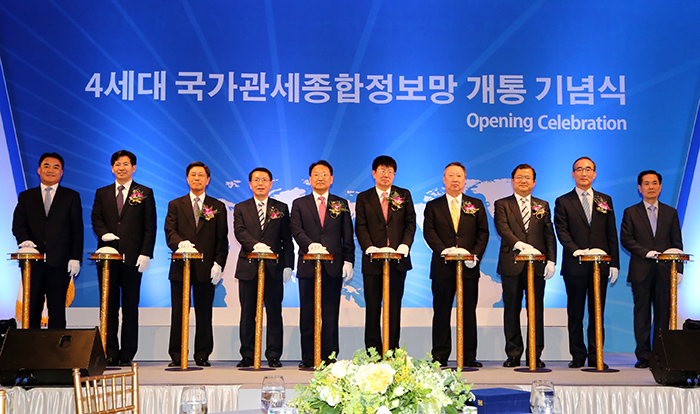| The Korean government has been concentrating on establishing e-government services since 1987 when it enacted laws expanding the supply of desktops and promoting the use of computer networks in order to provide high-quality government services to its citizens in a more convenient manner. Thanks to such ongoing efforts to develop related technologies, Korea’s e-government systems are now receiving praise from all around the world. We would like to trace this journey, from its initial footsteps through to some of today's successful cases, and look at future directions in which Korea's online government services and international cooperation could go. This is the second part of a series about the Korean government sharing its e-government systems with the world. It covers the electronic customs clearance system Uni-Pass. |
Recently, a lot of shoppers in Korea are purchasing baby goods, coffee, clothes, home appliances and other goods directly from overseas stores and websites. On the flip side, a growing number of overseas customers are buying stuff like cosmetics or clothes from Korea online and through their mobile devices.
According to statistics from the Korea Customs Service (KCS), Korean customers bought USD 1.55 billion worth of purchases from overseas shopping websites last year. In fact, the figure has been on the increase. In 2014, Korea recorded USD 1.544 billion worth of overseas shopping or importing, and it was only USD 472 million in 2011.
Similarly, Korea’s online sales to customers overseas last year were estimated at USD 161.39 million, more than 260 percent up from the previous year’s figure of USD 44.59 million. Korea’s so-called "e-commerce exports" have been showing a two-fold increase every year over the past few years. In 2013, they were at USD 23.96 million, at USD 10.63 million in 2012, and at USD 4.42 million in 2011.
Korean consumers prefer to shop overseas directly because they can buy goods at lower prices with lower distribution costs. Such shopping sprees have become a new consumption trend these days among Korean bargain-hunters. Behind the boom is the Korean government's well-developed electronic customs clearance system, called Uni-Pass. This system smoothes procedures for logistics, importing and exporting, all of which helps to increase international e-commerce.

Uni-Pass is an electronic customs clearance system that greatly shortens the time and cost required to handle imports, exports, taxes and custom duties.
Uni-Pass is Korea’s electronic customs clearance system. It's an online network that enables users to register goods to be bought or sold anywhere in the world, and helps them to work through Korean customs, and pay their taxes online without having to visit any customs or tax office. The system brought together all operational processes in one single website. Services range from registration for selling something or buying something online in another country, to all the other related procedures involving government organizations. Thanks to Uni-Pass, it takes only two minutes to process a sale to a customer overseas, down from more than one day in the past. Now, it takes only three or up to five hours to complete the registration to buy something from online overseas or to get a tax refund, a process that used to take more than two days. According to customs authorities, Uni-Pass saves USD 20 billion annually in terms of logistics for shipping and handling, taxes and cargo.
Uni-Pass connects to 260,000 online retailers and shoppers and includes 71 related organizations, including trading companies, shipping firms, airlines, freight forwarders, banks and government organizations, all in one united network. It allows users to complete all the necessary procedures through a single “unified” window to “pass” through customs. It deals with information about arrival and departure information about ships and airplanes, passenger information systems and cargo tracking systems. Uni-Pass also provides information about requirements needed for importing and exporting.
This electronic customs clearance system can be found at customs clearance offices at airports or ports. The Busan New Port used to experience difficulties in terms of customs clearance due to its rapidly growing cargo volume. In 2014, this was changed as a new Uni-Pass-based customs clearance system was introduced. The new system noticeably shortened the customs processing time to one hour, which used to be more than four hours in the past. The new electronic customs clearance system was installed at the port’s south and north docks to screen goods registered as imports. This enabled the port to register imports on-site, which made the customs process much easier and simpler. In the past, customs officers had to go through the customs clearance area -- run by six management offices and walking some 15 kilometers more than twice a day -- which took more than four hours to register an import, all of which was unnecessary, time-consuming procedures.
Uni-Pass also eased export regulations covering online sellers. If an exporter plans to export 500 cases a day on average, it used to take more than five minutes per each of the 500 cases to properly register each item for export. Some exporters had to give up on official registration procedures for this reason, as it took way too much time and was too much of a burden, which made them unable to receive government subsidies for firms that export.
Considering such difficulties, the government reduced the rules covering exporters to 37, from 57, starting from 2014. It introduced an e-commerce export and import system that allows firms to register up to 100 cases at once. The new system allows exporters to submit an Excel spreadsheet with information about export registration forms filled for 100 cases to register at Uni-Pass, all of which eased the export process.
Uni-Pass was not made overnight. It was developed as a result of the government’s continued efforts to establish an online customs network. In 1974, the Korea Customs Service (KCS) developed its first generation of IT systems in order to help launch integrated information networks to manage customs and duties, and to manage customs statistics. In 1984, the customs authority developed its second generation Electric Data Interchange Clearance System. In 2000, the KCS developed its third generation Internet Clearance System, or Uni-Pass.

Korea Customs Service Commissioner Yoon Young-sun (seated, far right) and his Ecuadorian counterpart sign a contract to export Korea’s electronic customs clearance systems to Ecuador, at Cheong Wa Dae in September 2010. Both the Korean and Ecuadorian presidents are present at the signing.
The core of this third generation clearance system, Uni-Pass, is the establishment of a one-stop online network to handle exports, imports and logistics. It was developed to process an increasing number of customs clearance tasks in response to the rapidly growing volume of exports and imports coming into and out of Korea.
Uni-Pass uses standard electronic document forms from the World Customs Organization (WCO) and the U.N. It uses internationally standardized systems that can be used by countries all around the globe, which has further attracted attention overseas.
Uni-Pass has won recognition worldwide for its performance and security. The World Bank evaluated KCS with the best environment for trading across borders for six years in a row now. The world’s attention on Uni-Pass has led to it now being exported itself.
Korea first exported Uni-Pass to Kazakhstan in 2005. Since then, the Korean government has exported the online customs and duties system to 10 countries, including Ecuador, Mongolia, Tanzania and Cameroon. As of 2015, Uni-Pass exports alone have recorded sales worth some USD 335.56 million.
Ecuador's use of Uni-Pass has proven its competitiveness. Ecuador introduced a single-window Uni-Pass-like system in 2010 and 2011 to establish its own customs clearance system, ECUAPASS. ECUAPASS was awarded an innovation award by the WCO in 2013 for its time-saving and for reducing logistics costs.

Korea and Cameroon sign a contract to export the Uni-Pass system to the West African nation in September 2015. In the photo, then-KCS Commissioner Kim Nak-hoe (left) and Cameroon's Director General of Customs Minette Libom Li Likeng pose for a photo after signing the contract in Yaounde, the Cameroonian capital.
Korea and Cameroon signed an export contract worth USD 240 million for the Uni-Pass system in September last year. Cameroon’s case is different than previous cases, as it includes the entire Uni-Pass system, unlike past contracts that only used parts of the Uni-Pass system. So far, Cameroon’s case is the single largest export of a Korean e-government service. Under the contract, Korea will establish an electronic customs clearance system for the West African nation and provide management and repair services for 12 years.
Cameroon's Director General of Customs Minette Libom Li Likeng said that, “Uni-Pass is one strong system that solves many problems and provides all functions.”
“When the system is developed successfully, it will help collect taxes easily, facilitate trade, and be able to contribute to national economic development,” she said.

In June 2016, the KCS introduced its fourth generation smart clearance system. Government officials, including KCS Commissioner Cheon Hong-uk, attend a ceremony to mark the introduction of the mobile-based clearance system.
Uni-Pass continues to evolve. In June this year, the Korea Customs Service introduced its fourth generation "smart" clearance system by improving the existing Uni-Pass system and heightening security. The newly-introduced system is designed to ease customs declaration for users using their smartphones. By using this new system, people can get information about customs administration tailored for their individual case or company. They can make various customs registrations and process tax payments, such as customs for international mail and freight or registering distribution records. The new system also accelerates customs procedures so that individual consumers can receive their purchased goods ordered from overseas websites within a few days.
Korea has been working hard to cooperate with the world in regard to electronic clearance systems. The KCS has been working with the Colombian and Peruvian governments to export Uni-Pass ever since President Park Geun-hye’s visited South America last year. It has also been negotiating with the Ethiopian and Ugandan authorities to cooperate on using Korean online clearance systems there.
By Yoon Sojung
Korea.net Staff Writer
Photos: KCS
arete@korea.kr